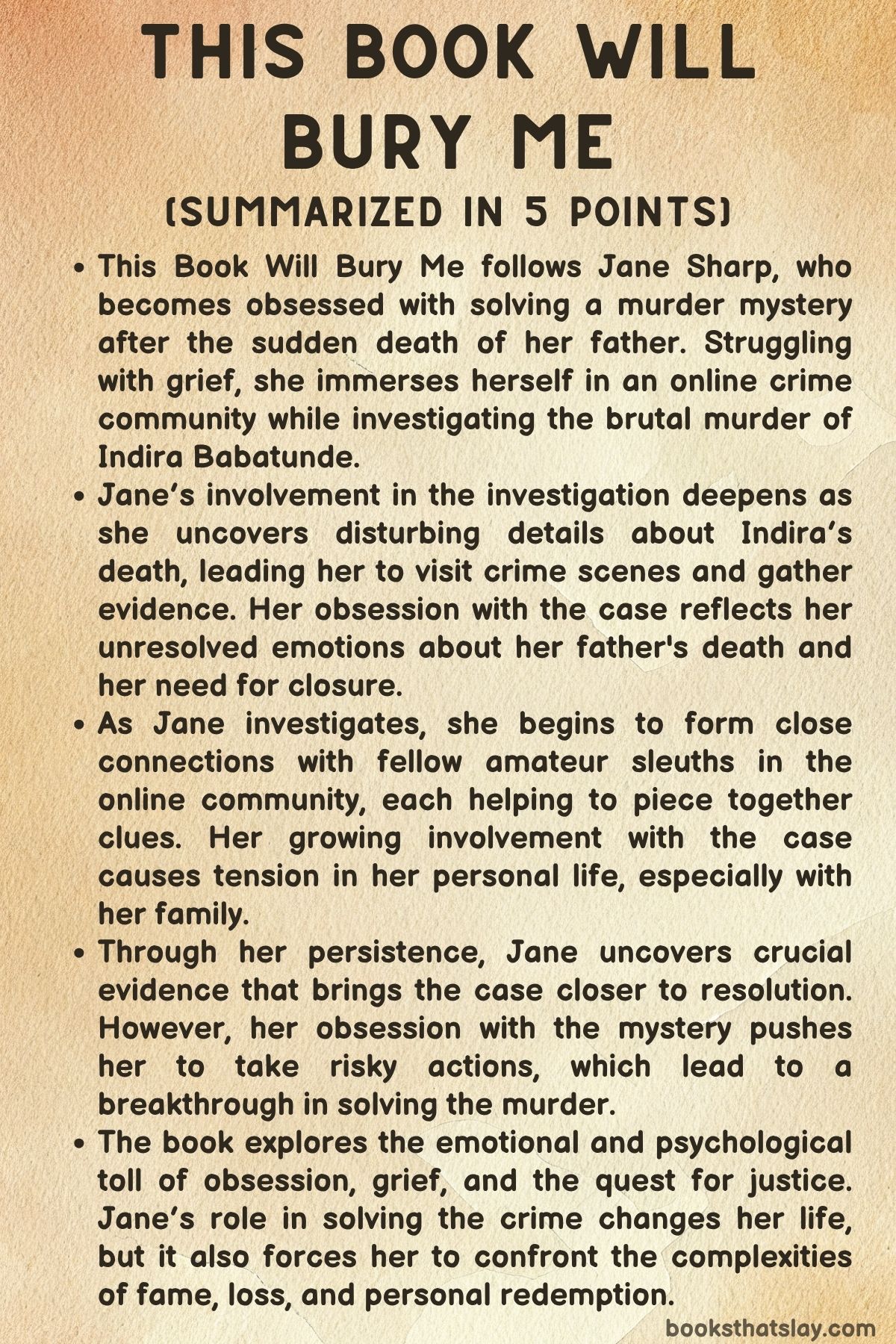This Book Will Bury Me Summary, Characters and Themes
This Book Will Bury Me by Ashley Winstead is a psychological thriller that explores the complex emotions of grief and the deep entanglements of amateur crime solving. The protagonist, Jane, finds herself spiraling after the sudden death of her father, which pushes her into an obsessive investigation of a brutal murder.
What begins as a search for justice for a stranger soon becomes intertwined with her own unresolved emotions surrounding her father’s death. As Jane navigates the world of true-crime forums and amateur sleuthing, she uncovers painful truths about herself, the murder case, and the lengths people will go to in pursuit of answers.
Summary
The novel follows Jane, who is grappling with the sudden and unexpected death of her father. His passing leaves Jane in emotional turmoil, and the overwhelming grief she feels causes her to seek solace in an unusual way.
Instead of focusing on her own healing, Jane becomes consumed with solving the mystery of a nearby murder—the murder of Indira Babatunde, a quiet woman found dismembered in Lake Okeechobee. Jane’s emotional vulnerability drives her to immerse herself in the world of online true-crime communities, where she seeks answers to both the murder and the deep, unresolved feelings about her father’s death.
Jane’s involvement in the investigation becomes all-consuming as she searches for clues and unravels details about Indira’s life. She begins by scouring the internet for leads and trying to piece together the events leading to Indira’s death.
Her obsession grows as she visits the crime scene and attempts to access security footage from a nearby convenience store. But her efforts are constantly thwarted, reflecting the emotional hurdles she faces as she confronts her own unresolved grief.
As the story unfolds, Jane’s need for answers about Indira’s death parallels her struggle to come to terms with the loss of her father. She finds herself questioning her father’s refusal to take the medication that could have saved his life, wondering if his death was a result of his own decisions or some other, hidden factor.
The murder case, in many ways, serves as a vehicle for Jane to explore the complicated emotions she feels about her father’s life and death.
As Jane becomes more entangled in the case, she uncovers significant details about Indira’s life. The investigation takes a sharp turn when Jane discovers a connection between Indira’s murderer and a person named Greg Brownville.
Brownville, Indira’s boss at an arboretum, is revealed to have been involved in a sordid plot to kill her and steal a $75,000 sweepstakes prize she had won. The crime is brutal, and Jane’s obsession with solving it intensifies as she begins to form a clearer picture of the murder and the people responsible.
Despite facing many setbacks, including resistance from the authorities and challenges in her personal life, Jane’s investigation into Indira’s murder gradually reveals more damning details. She learns of the role played by Sheila Watson, an accomplice of Greg’s, who helped dismember Indira’s body to cover up the crime.
As Jane digs deeper, she realizes that her own search for justice is driven by more than just her desire to solve a mystery—it is also a reflection of her unresolved grief, guilt, and search for meaning in the wake of her father’s death.
Throughout her investigation, Jane becomes more involved with the online crime-solving community. She forges connections with other amateur sleuths, including Citizen, Mistress, and Goku, who offer their insights into the case.
The group’s collective research leads to a crucial discovery: a potential murder weapon hidden at the arboretum where Greg works. Jane’s involvement in the investigation grows, and she begins to feel like an integral part of the team, despite her own personal struggles.
However, the deeper Jane delves into the case, the more she realizes that her obsession with solving the murder is preventing her from dealing with her own emotions. Her grief becomes more palpable as she faces the stark reality of her father’s cremation and the remnants of him that now only exist as ashes.
At times, it seems as though her investigation into Indira’s death is a way for her to avoid confronting her own grief, using the case as a distraction from the pain of losing her father.
As Jane’s investigation reaches its climax, she makes a breakthrough discovery about Greg and Sheila’s gruesome plan to murder Indira. The group of sleuths, including Jane, pieces together the details of the crime, which ultimately leads to their arrest.
Despite the success in solving the case, Jane is left with a lingering sense of emptiness. Her search for justice for Indira has consumed her life, but it has not provided her with the closure she desperately needs regarding her father’s death.
The resolution of the case brings Jane both recognition and criticism. She becomes a minor celebrity within the true-crime community, her involvement in solving Indira’s murder earning her both praise and scorn.
Some members of the community regard her as a hero, while others feel that she has overshadowed their own contributions. This mixed reception forces Jane to confront the complexities of fame, grief, and the emotional cost of her investigation.
Ultimately, Jane’s journey is one of self-discovery, as she comes to terms with both the loss of her father and her role in solving a brutal murder. The narrative explores themes of loss, guilt, and the psychological toll of deep emotional immersion in a crime investigation.
Jane’s obsessive search for answers highlights the lengths people will go to in order to make sense of their grief and to find meaning in a world that feels chaotic and uncontrollable. Through her actions and her internal struggle, Jane learns that finding answers is not always the key to healing, and sometimes the journey to closure is more complex than it first appears.

Characters
Jane Sharp
In This Book Will Bury Me, Jane Sharp is the protagonist whose emotional journey forms the backbone of the narrative. She begins the story engulfed in grief after the sudden death of her father, which leads her to a profound sense of loss.
This grief, rather than fading with time, becomes the catalyst for Jane’s obsession with the murder of Indira Babatunde. Through her investigation into the crime, Jane is driven not only by the need for justice for Indira but also by an unresolved need to understand her father’s death.
The way Jane immerses herself in the online true-crime community and becomes entangled in the details of the case reflects her struggle to come to terms with the loss of someone she loved dearly. As she delves deeper into the investigation, Jane’s identity starts to shift.
She transitions from a grieving daughter to a determined amateur sleuth, unable to stop until she uncovers the truth about Indira’s death. Jane’s fixation with the case blurs the lines between personal grief and the pursuit of justice, revealing how deeply intertwined loss and obsession can be.
Her emotional vulnerability, paired with her growing detachment from the real world, underscores the psychological toll the investigation takes on her. Jane’s arc culminates in her transformation into a minor celebrity within the true-crime community, where she must reconcile her quest for answers with the moral complexities of fame, guilt, and grief.
Indira Babatunde
Indira Babatunde, though a secondary character, plays a pivotal role in the development of the story. A quiet and inconspicuous woman, Indira’s life is tragically cut short when she is murdered by her boss, Greg Brownville, and his accomplice, Sheila Watson.
Before her death, Indira had won a sweepstakes prize, which becomes a key element in the motive for her murder. Her murder is brutal, her body dismembered and discarded, and her story serves as the emotional backdrop for Jane’s investigation.
Indira’s character, despite not being alive in the narrative, is central to Jane’s emotional healing. Her life and death, shrouded in mystery and injustice, drive Jane’s obsession with uncovering the truth.
Indira represents the fragility of life and the hidden stories of those who go unnoticed, her murder becoming a symbol of the randomness of violence. Through Jane’s quest to understand Indira’s life and untangle the details of her death, Indira’s character acts as a catalyst for Jane’s own journey of self-exploration and emotional reckoning.
Greg Brownville
Greg Brownville, one of the antagonists of the story, is the employer who orchestrates the murder of Indira Babatunde. His character is marked by financial desperation and moral corruption.
Greg’s role in the murder is driven by greed, as he and his accomplice, Sheila Watson, are determined to claim Indira’s sweepstakes winnings. Greg’s actions are ruthless, as he tortures and kills Indira, and then participates in the dismemberment of her body to hide the evidence.
He represents the darker side of human nature—how desperation can lead people to commit heinous acts. In the narrative, Greg’s role is more than just that of a villain; he embodies the extremities of selfishness and violence, showing how an individual’s moral compass can break under the weight of financial stress.
Greg’s involvement in the crime is also a reminder of the dangers that can arise from the abuse of power and the manipulation of vulnerable individuals.
Sheila Watson
Sheila Watson, Greg Brownville’s accomplice, shares his motives but also reveals her own personal complicity in Indira’s murder. Though she does not emerge as prominently as Greg in the narrative, Sheila’s role is equally essential.
Her character shows a lack of morality and empathy, participating in the brutal act of murdering a defenseless woman for monetary gain. Sheila’s involvement in the murder and subsequent cover-up speaks to the depth of human depravity and the ease with which individuals can be swayed into committing horrific acts when driven by greed.
As an accomplice, Sheila reflects the idea of blind allegiance and the potential for individuals to justify their involvement in immoral acts when aligned with a cause or a person they trust. Sheila’s moral corruption is as significant as Greg’s, and her willingness to follow his lead despite the consequences highlights the dangerous dynamics of toxic relationships.
Citizen (Peter Bishop)
Citizen, whose true identity is Peter Bishop, is a key figure in the online sleuthing community that Jane becomes involved with. Initially, he is a trusted ally within the group, contributing significant insights to the investigation into Indira’s death.
However, as the story unfolds, Citizen’s true nature is revealed, and it is discovered that he is the serial killer behind a series of murders. His manipulation of the investigation, as well as his ability to deceive and control those around him, is a stark reminder of how dangerous it can be when someone possesses both charm and malevolent intentions.
Citizen’s role as a killer hiding in plain sight speaks to the complex layers of human behavior, where an outwardly supportive figure can harbor dark, violent tendencies. His character is a chilling representation of betrayal, as he leads the investigation to a false sense of security before revealing his true identity.
The revelation of his crimes shifts the narrative from one of pursuit to one of survival, with the team confronting the horrific reality of having been manipulated by someone they trusted. Citizen’s complex psychology, driven by a need for control and recognition, adds a sinister layer to the story and complicates the theme of justice.
Mistress
Mistress, another member of the online sleuthing group, is crucial to the unfolding of the investigation. She begins as a well-intentioned and reliable member of the team but becomes a tragic figure when she goes missing.
Her disappearance coincides with the growing suspicions around Citizen’s involvement in the murders, and her absence becomes symbolic of the increasing danger the group faces. Mistress’s role in the investigation is not just to offer support to Jane but also to exemplify the emotional costs of engaging too deeply in the pursuit of justice.
Her vanishing highlights the personal sacrifices the group makes in the name of truth, and it serves as a grim reminder that the search for answers can sometimes lead to irreversible consequences.
Lightly
Lightly is another member of the sleuthing community who plays a significant role in Jane’s investigation. Unlike the others, Lightly is more cautious and analytical, offering a voice of reason within the increasingly chaotic search for answers.
His relationship with Jane is complex, marked by moments of support and tension. Lightly serves as a grounding force in Jane’s descent into obsession, offering her a semblance of balance as she navigates the emotional toll of the case.
His level-headed approach contrasts with Jane’s impulsiveness, and though he occasionally cautions her against diving too deeply into the mystery, he is ultimately a key figure in her investigation. Lightly’s character represents the need for rationality in the face of overwhelming emotion, serving as a reminder of the importance of keeping a sense of perspective when chasing after elusive truths.
Themes
Grief and Loss
The narrative of This Book Will Bury Me explores the profound and multifaceted experience of grief through the character of Jane, who is still reeling from the sudden loss of her father. This theme shapes much of the story, providing emotional depth to the protagonist’s motivations and actions.
Jane’s grief is not only defined by her mourning but also by a sense of unfinished business, particularly the fact that she was unable to say goodbye to her father before his death. The suddenness of his heart attack leaves her with a fractured sense of closure, pushing her into an obsessive pursuit of answers.
Jane’s grief manifests in multiple forms, including guilt, regret, and an overwhelming need to make sense of her father’s life and death. Her fixation on the murder of Indira Babatunde becomes, in many ways, an extension of her struggle to understand death and to reclaim some form of control over the uncertainty surrounding the end of a life.
Throughout the novel, Jane’s grief is not something that she can simply process or overcome; rather, it becomes a lens through which she navigates the world, affecting her relationships and influencing her decisions. Her descent into the world of amateur sleuthing, particularly in connection with the crime forum, highlights the way in which unresolved grief can morph into obsession and shape one’s identity in unforeseen ways.
Obsession and Escape
Jane’s immersion into the true-crime community represents a broader exploration of how obsession can arise as a coping mechanism in response to emotional turmoil. After the devastating loss of her father, Jane finds herself adrift, unable to make sense of her own emotions.
This disorientation leads her to focus on the mystery of Indira Babatunde’s murder as a way to distract herself from her grief. The crime becomes more than just an intellectual puzzle—it becomes her escape from confronting the complexity of her own feelings.
This obsession allows Jane to immerse herself in a world where answers seem attainable, even though they are often elusive. The deeper she delves into the case, the more she becomes entrenched in the world of online sleuths, and the more her identity becomes entangled with the case itself.
Her ability to focus on the murder allows her to avoid confronting the uncomfortable reality of her father’s death and the emotions that surround it. However, as Jane becomes more obsessed with solving the case, the boundaries between personal grief and investigative drive blur, leading her to take risks that jeopardize both her safety and her relationships.
The theme of obsession underscores how trauma can push individuals toward unhealthy coping strategies, drawing attention to the fine line between finding solace in distraction and losing oneself to it.
The Search for Justice
Justice serves as another critical theme in This Book Will Bury Me, particularly as it relates to Jane’s quest for meaning after her father’s death. As she becomes more entangled in the investigation of Indira’s murder, Jane is not only searching for the truth about the crime but also grappling with her own need for closure.
Indira’s brutal and senseless death serves as a symbol of the randomness and cruelty of life, and Jane’s pursuit of justice represents her attempt to impose order on a chaotic world. In this sense, her investigation is not only about bringing a criminal to justice but also about her own attempt to understand the moral universe in which she lives.
As Jane unravels the details of the crime, she uncovers more than just the facts surrounding Indira’s murder—she is forced to confront the ethical implications of her own actions, as well as the moral complexities of those involved in the case. The theme of justice is complicated further by the interplay between public and personal justice.
While Jane seeks justice for Indira, her motivations are also shaped by her unresolved grief and the need to restore a sense of balance after the unfairness of her father’s untimely death. The novel explores how justice is not a fixed concept but a deeply personal and evolving journey for the individuals involved.
Identity and Transformation
As Jane becomes increasingly absorbed in the case of Indira Babatunde’s murder, her sense of identity undergoes a significant transformation. The investigation shifts her self-perception, as she moves from being a grieving daughter to a central figure in a crime-solving community.
This transformation is not without its complications. At first, Jane sees herself as an outsider in the true-crime world, unsure of her place in a community dominated by more experienced sleuths.
However, as she makes discoveries and unravels clues, she gains recognition and a sense of belonging. This sense of belonging, however, is double-edged.
While it grants her a measure of control over a world that feels increasingly out of her control, it also further detaches her from her personal grief. In pursuing the case, Jane reshapes her identity in ways that blur the line between who she was before her father’s death and who she becomes as a result of it.
The more she immerses herself in the investigation, the more she is forced to confront the complexities of her own identity. The story underscores how trauma and grief can alter one’s sense of self, sometimes in unexpected and even dangerous ways.
Jane’s transformation is a reflection of the broader theme of how personal tragedy can serve as a catalyst for change, sometimes leading individuals down paths they might never have taken under different circumstances.
The Dark Allure of True Crime
The narrative also explores the dark allure of true crime, a theme that is deeply woven into Jane’s involvement in the online sleuthing community. As Jane becomes more invested in solving Indira’s murder, she is drawn into the world of amateur detectives, where the boundaries between entertainment and reality begin to blur.
True crime, in this context, is not just a passive consumption of stories but an active engagement with real-life tragedy. The novel illustrates how the pursuit of justice in such a community can offer a sense of purpose and excitement, but it also exposes the moral and psychological toll of becoming too involved in the lives of victims.
For Jane, the allure of true crime is initially a way to escape her grief, but it soon becomes a dangerous obsession that leads her to neglect her own well-being and relationships. The dark fascination with true crime is a powerful undercurrent throughout the story, raising questions about the ethical implications of exploring real-life tragedies for personal gain or entertainment.
It forces readers to consider the fine line between justice and exploitation, and the emotional toll that comes with immersing oneself in a world where tragedy is both captivating and horrifying.
The Consequences of Obsession
The consequences of obsession are explored thoroughly in This Book Will Bury Me, particularly in Jane’s relationship with the case of Indira Babatunde’s murder. As she becomes more obsessed with solving the crime, her personal life begins to disintegrate.
Her relationships with family and friends become strained, and her physical and emotional health deteriorate as she continues to prioritize the investigation over everything else. Jane’s obsession with the case mirrors the broader theme of how unchecked fixation on an external goal can have serious personal consequences.
The novel demonstrates how obsession can consume an individual, leading them to make reckless decisions and lose touch with their own emotions. Jane’s inability to detach from the case highlights the dangers of focusing solely on a singular pursuit, especially when it stems from unresolved emotional pain.
The consequences of obsession are not just about the external fallout, but also about the internal toll it takes, as characters struggle to reconcile their desires for justice with the emotional wreckage they leave in their wake. Ultimately, the theme of obsession serves as a cautionary tale about the dangers of becoming too deeply entrenched in something at the expense of one’s own well-being and personal connections.


